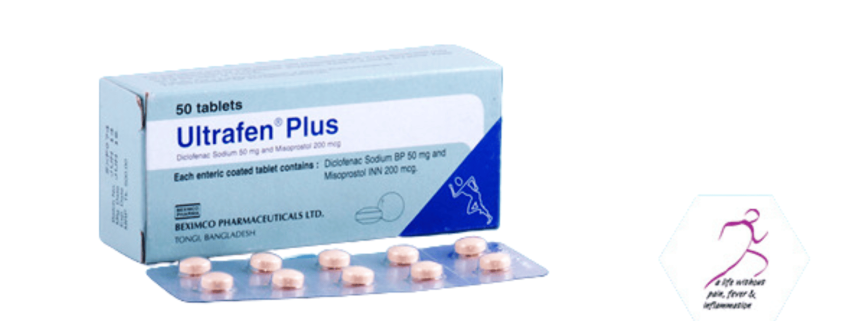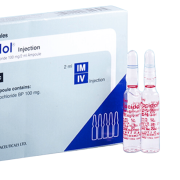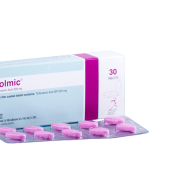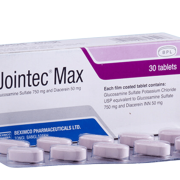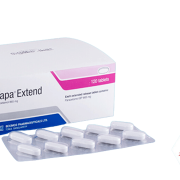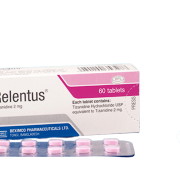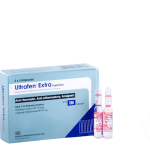Ultrafen Plus
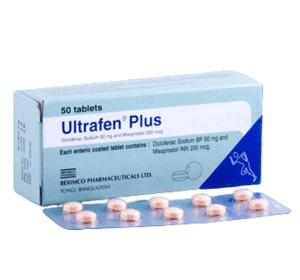
Generic Name: Diclofenac Sodium and Misoprostol
Dosage Form: Tablet
TG Name: Musculoskeletal
1. What Ultrafen® Plus is and what it is used for?
Ultrafen® Plus is a combination product containing Diclofenac Sodium, a nonsteroidal anti-inflammatory drug (NSAID) with analgesic properties, and Misoprostol, a gastrointestinal (GI) mucosal protective prostaglandin E1 analogue.
This combination product is indicated for the treatment of signs and symptoms of osteoarthritis or rheumatoid arthritis in patients at high risk of developing NSAID induced gastric and duodenal ulcers and their complications.
2. Before you take Ultrafen® Plus
Do not take this medicine and tell your doctor if:
Before taking Ultrafen® Plus, tell your doctor or pharmacist if you are allergic to it; or if you have any other allergies.
Diclofenac Sodium and Misoprostol combination is used cautiously in patients with an underlying condition such as inflammatory bowel disease, or those in whom dehydration should be monitored carefully.
Take special care with Ultrafen® Plus
Check with your doctor before taking this medicine if:
Ultrafen® Plus is contraindicated in pregnant women because of the abortifacient property of Misoprostol. The drug is contraindicated in patients with hypersensitivity to any of its ingredients.
Taking other medicines
Aspirin: Concomitant administration with aspirin is not recommended because Diclofenac Sodium is displaced from its binding sites by Aspirin, resulting in lower plasma concentrations, peak plasma levels and AUC values.
Digoxin: Elevated digoxin levels have been reported in patients receiving digoxin and Diclofenac Sodium concomitantly.
Antihypertensives: NSAIDs can inhibit the activity of antihypertensives, including ACE inhibitors. Thus, caution should be taken when administering it with such agents.
Warfarin: The effects of warfarin and NSAIDs on GI bleeding are synergistic, such that users of both drugs together have a risk of serious bleeding greater than users of either drug alone.
Oral hypoglycaemics: Diclofenac Sodium does not alter glucose metabolism in healthy people nor it alters the effects of oral hypoglycaemics. There are rare reports, however, from marketing experience, of changes in effects of insulin or oral hypoglycaemics in the presence of Diclofenac Sodium that necessitated change in the doses of such agents. Both hypoand hyperglycaemic effects have been reported. A direct causal relationship has not been established, but physicians should consider the possibility that Diclofenac Sodium may alter a diabetic patient’s response to insulin or oral hypoglycaemics.
Antacids: Antacids reduce the bioavailability of Misoprostol acid and may delay absorption of Diclofenac Sodium. Magnesium containing antacidsexacerbate Misoprostol associated diarrhoea. Thus, it is not recommended that it be coadministered with antacids.
Diuretics: The Diclofenac Sodium component like other NSAIDs, can inhibit the activity of diuretics. Concomitant therapy with potassium sparing diuretics may be associated with increased serum potassium levels
Pregnancy and breast-feeding
Ultrafen® Plus is contraindicated in pregnant women because of the abortifacient property of Misoprostol.
Because of the potential for serious adverse reactions in nursing infants, Diclofenac Sodium and Misoprostol combination is not recommended for use by nursing mothers.
3. How to take Ultrafen® Plus?
Osteoarthritis: The recommended dosage for maximal GI mucosal protection is Diclofenac Sodium 50 mg plus Misoprostol 200 mg tid. For patients who experience intolerance, Diclofenac Sodium 75 mg plus Misoprostol 200mg bid or Diclofenac Sodium 50 mg plus Misoprostol 200 mg bid can be used.
Rheumatoid arthritis: The recommended dosage is Diclofenac Sodium 50 mg plus Misoprostol 200 mg tid or qid. For patients who experience intolerance, Diclofenac Sodium 75 mg plus Misoprostol 200 mg bid or Diclofenac Sodium 50 mg plus Misoprostol 200 mg bid can be used.
If you forget to take Ultrafen® Plus
If you forget to take a dose, take it as soon as you remember it. If it is almost time for your next dose, do not take the missed dose. Take the next dose on time
If you stop taking Ultrafen® Plus
Do not stop taking this medicine without talking to your doctor. You should not stop taking Ultrafen® Plus just because you feel better. This is because the problem may come back or get worse again.
If you have any further questions on the use of this product, ask your doctor or pharmacist.
4. Possible side effects
Like all medicines, Ultrafen® Plus can cause side effects, although not everybody gets them.
The most common reported side effects are abdominal pain, diarrhoea and other GI symptoms. Diarrhoea and abdominal pain developed early in the course of therapy, and were usually self limited (resolved after 2 to 7 days). Rare instances of profound diarrhoea leading to severe dehydration have been reported in patients receiving Misoprostol.
5. How to store Ultrafen® Plus?
Store in a cool and dry place, away from light.
Keep out of reach of children

